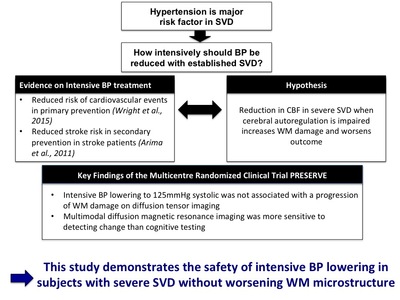Markus, HS;
Egle, M;
Croall, ID;
Sari, H;
Khan, U;
Hassan, A;
Harkness, K;
MacKinnon, A;
O'Brien, JT;
Morris, RG;
et al.
Markus, HS; Egle, M; Croall, ID; Sari, H; Khan, U; Hassan, A; Harkness, K; MacKinnon, A; O'Brien, JT; Morris, RG; Barrick, TR; Blamire, AM; Tozer, DJ; Ford, GA; PRESERVE Study Team
(2021)
PRESERVE: Randomized Trial of Intensive Versus Standard Blood Pressure Control in Small Vessel Disease.
Stroke, 52 (8).
pp. 2484-2493.
ISSN 1524-4628
https://doi.org/10.1161/STROKEAHA.120.032054
SGUL Authors: Barrick, Thomas Richard
|
PDF
Accepted Version
Available under License ["licenses_description_publisher" not defined]. Download (331kB) | Preview |
|
|
PDF (Supplementary material)
Accepted Version
Available under License ["licenses_description_publisher" not defined]. Download (553kB) | Preview |
|
|
Image (TIFF) (Figure 1)
Accepted Version
Available under License ["licenses_description_publisher" not defined]. Download (40MB) | Preview |
|
|
Image (TIFF) (Figure 2)
Accepted Version
Available under License ["licenses_description_publisher" not defined]. Download (5MB) | Preview |
|
|
Image (TIFF) (Figure 3)
Accepted Version
Available under License ["licenses_description_publisher" not defined]. Download (2MB) | Preview |
|
![[img]](https://openaccess.sgul.ac.uk/113496/33.hassmallThumbnailVersion/graphical_description_Abstract.jpg)
|
Image (JPEG) (Graphical abstract)
Accepted Version
Available under License ["licenses_description_publisher" not defined]. Download (154kB) | Preview |
Abstract
Background and Purpose: In cerebral small vessel disease, cerebral blood flow and autoregulation are impaired and therefore excessive blood pressure reduction could possibly accelerate white matter damage and worsen outcome. The trial determined, in severe symptomatic cerebral small vessel disease, whether intensive blood pressure lowering resulted in progression of white matter damage assessed using diffusion tensor imaging. Methods: Randomized, parallel, multicenter controlled, blinded-outcomes clinical trial. One hundred eleven participants with magnetic resonance imaging confirmed symptomatic lacunar infarct and confluent white matter hyperintensities and were recruited and randomized to standard (systolic=130–140 mmHg) (N=56) or intensive (systolic<125 mmHg) (N=55) blood pressure targets. The primary end point was change in diffusion tensor imaging white matter mean diffusivity peak height between baseline and 24 months. Secondary end points were other magnetic resonance imaging markers and cognition. Results: Patients were mean 68 years and 60% male. Mean (SD) blood pressure reduced by −15.3 (15.4) and −23.1 (22.04) mm Hg in the standard/intensive groups, respectively (P<0.001). There was no difference between treatment groups for the primary end point: standard, adjusted mean (SE)=12.5×10−3 (0.2×10−3); intensive, 12.5×10−3 (0.2×10−3), P=0.92. In the whole population over 24 months follow-up, there was a significant deterioration in white matter microstructure but no detectable decrease in cognition. Conclusions: Intensive blood pressure lowering in severe cerebral small vessel disease was not associated with progression of white matter damage on diffusion tensor imaging or magnetic resonance imaging. In a multicentre study setting over 2 years, multimodal diffusion tensor imaging-magnetic resonance imaging was more sensitive to detecting change than cognitive testing.
Statistics
Actions (login required)
 |
Edit Item |



